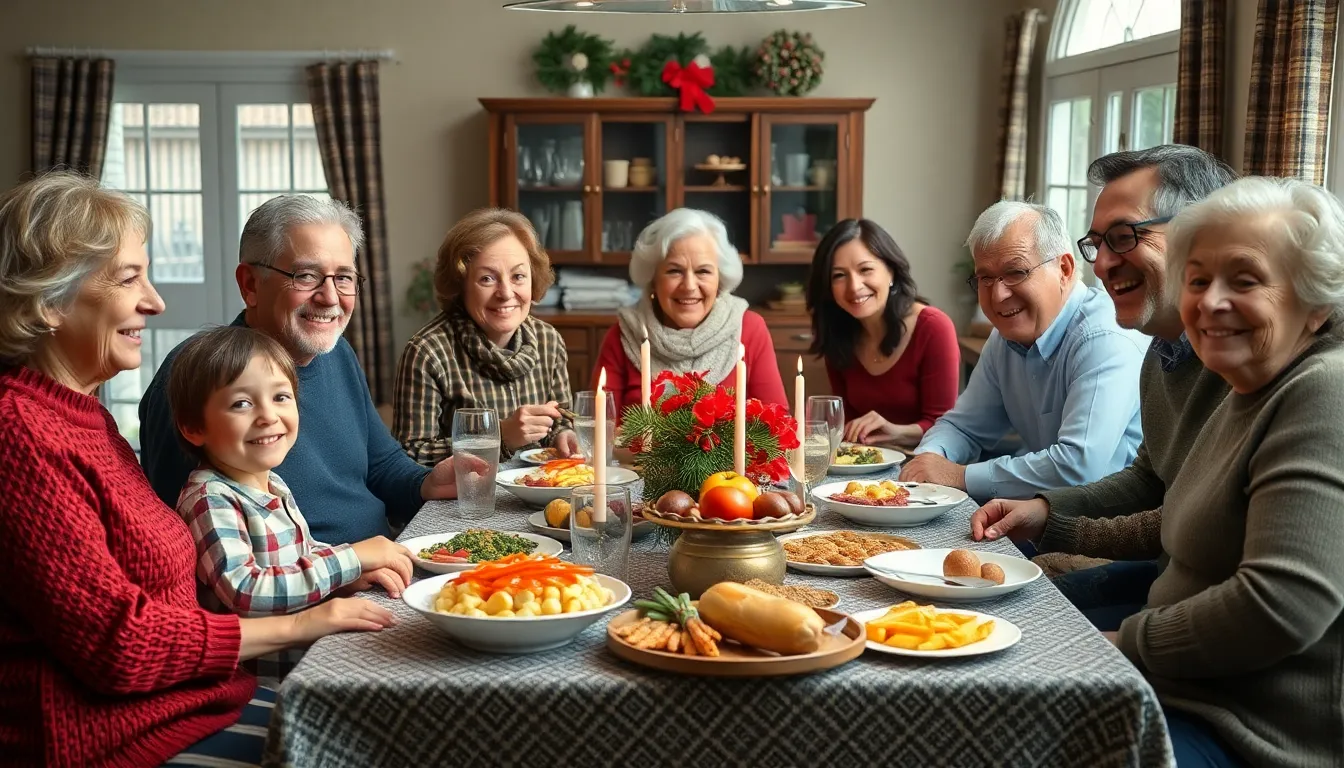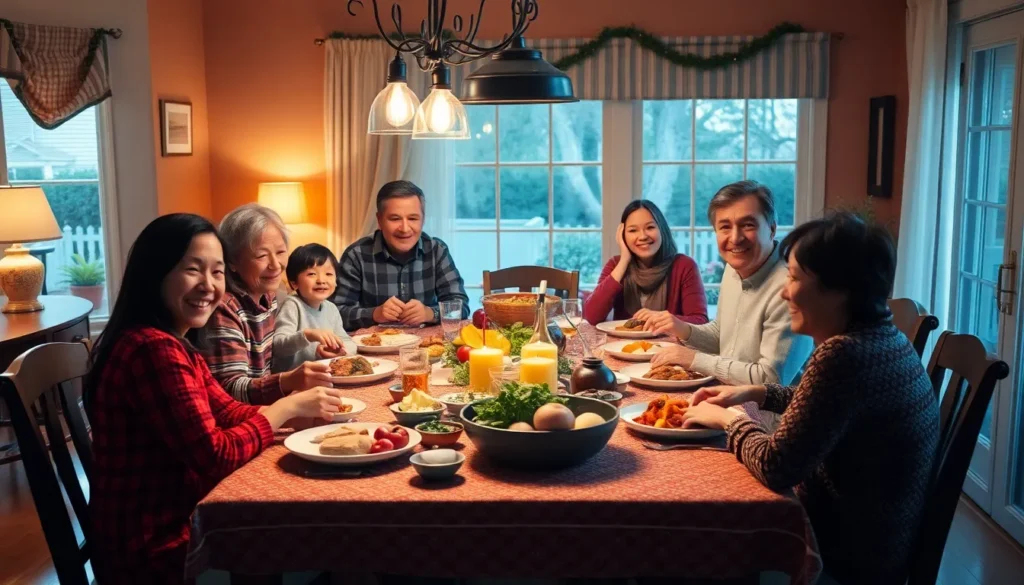Family tradition social groups play a vital role in shaping identities and strengthening bonds. These groups often revolve around shared customs, values, and activities that bring family members together, creating a sense of belonging and continuity. In a world where individualism often takes center stage, these traditions remind us of the importance of connection and heritage.
Participating in family tradition social groups can lead to enriching experiences, from holiday celebrations to regular gatherings. They not only preserve cultural practices but also foster communication and understanding among generations. As families navigate the complexities of modern life, these groups serve as a foundation for support and unity, ensuring that cherished traditions endure and evolve.
Table of Contents
ToggleOverview of Family Tradition Social Groups
Family tradition social groups consist of family members who actively engage in collective customs, rituals, and values. These groups foster connections that enhance familial identities and promote a sense of belonging. Members participate in various activities such as holiday celebrations, reunions, and storytelling sessions, ensuring cherished traditions remain alive.
Participation in family tradition social groups cultivates communication skills, especially among younger generations. By sharing stories and experiences, family members convey important lessons, values, and cultural heritage. This process strengthens intergenerational relationships, enabling families to adapt while preserving core traditions.
Studies indicate that consistent involvement in family traditions positively impacts mental health and emotional well-being. The feelings of support, unity, and continuity derived from these traditions help families navigate modern challenges. In an era of rapid change, family tradition social groups serve as anchors, grounding members in their identities and shared history.
Importance of Family Tradition Social Groups

Family tradition social groups play a crucial role in shaping identities and fortifying familial connections. They provide a nurturing environment that fosters communication and understanding across generations.
Strengthening Family Bonds
Strengthening family bonds occurs through shared experiences within these social groups. Activities like holiday celebrations and family reunions create opportunities for meaningful interactions. Engaging in traditions allows family members to connect on emotional levels, fostering trust and loyalty. Participating in storytelling sessions enhances understanding of family history and values, reinforcing a sense of belonging. Strong family bonds lead to improved emotional support systems, enabling families to face challenges together.
Cultural Preservation
Cultural preservation is another vital aspect of family tradition social groups. These groups actively engage in maintaining customs, rituals, and values that might otherwise fade away in modern society. Participation in traditional ceremonies ensures that cultural heritage is passed down, keeping it alive for future generations. By practicing these traditions, families reinforce their identity, ensuring that their cultural narratives are understood and appreciated. Studies show that cultural engagement supports personal identity and instills pride, creating a strong foundation for individuals within their communities.
Types of Family Tradition Social Groups
Family tradition social groups encompass various configurations, each contributing uniquely to familial bonds and cultural preservation. The following categories illustrate these distinct types.
Immediate Family Groups
Immediate family groups consist of the nuclear family, typically including parents and their children. These groups engage in rituals such as weekly family dinners and holiday celebrations that reinforce bonds. Activities like game nights and shared storytelling sessions enhance communication, especially among children. Regular interactions within immediate family groups maintain strong connections, offering emotional support and continuity across generations.
Extended Family Networks
Extended family networks include relatives beyond the nuclear family, such as grandparents, aunts, uncles, and cousins. These networks enhance tradition through larger family gatherings and reunions, providing a broader context for cultural practices. By including various family members, these groups facilitate a rich exchange of stories and experiences. Participation in extended family events often emphasizes heritage, linking younger generations to their ancestry and fostering a sense of belonging.
Community-Based Family Groups
Community-based family groups extend beyond biological ties, bringing together families and individuals sharing similar cultural traditions or values. These groups often organize community festivals and cultural events, allowing families to connect socially while showcasing their heritage. Participating in these collective experiences strengthens ties among diverse families and cultivates shared cultural appreciation. Through collaboration in activities such as potlucks, workshops, and celebrations, these groups nurture a sense of unity and cultural pride, enriching the fabric of the community.
Activities and Practices in Family Tradition Social Groups
Family tradition social groups facilitate various activities and practices that nurture relationships and preserve cultural heritage. These actions foster a shared identity among members and strengthen familial connections.
Celebrations and Rituals
Celebrations and rituals play a crucial role in family tradition social groups. These events, marked by specific meanings, bring families together for moments of joy and reflection. Examples include annual holiday gatherings, such as Thanksgiving and Christmas, where families engage in long-standing customs. Rituals like weddings and christenings signify life transitions and reinforce familial bonds through collective participation. Specific practices, like lighting candles for Hanukkah or setting off fireworks for the Fourth of July, allow families to express cultural identity while creating lasting memories.
Shared Meals and Gatherings
Shared meals and gatherings serve as vital elements within family tradition social groups. Families often organize weekly dinners or seasonal get-togethers, fostering open communication and emotional support. Dining together encourages sharing stories and passing down values, ensuring cultural information flows between generations. Special dishes prepared during these gatherings often hold historical significance and encourage culinary traditions to thrive. Events like family reunions allow extended families to reconnect, strengthening ties and enhancing depth in relationships through shared food experiences.
Challenges Faced by Family Tradition Social Groups
Family tradition social groups encounter several challenges that can hinder their ability to maintain customs and foster connections. Among these are modernization and geographic dispersal, which significantly impact the continuity of family traditions.
Modernization and Change
Modernization introduces new lifestyles and values that can conflict with established family traditions. Technology influences communication and engagement, often leading to less face-to-face interaction among family members. As individuals prioritize busy schedules and digital connections, traditional gatherings may decrease in frequency or significance. New cultural influences can dilute or reshape customs, making it difficult for family traditions to persist unaltered. Maintaining relevance and adapting practices to fit contemporary contexts is essential for family tradition social groups.
Geographic Dispersal
Geographic dispersal poses another significant challenge for family tradition social groups. Families frequently relocate for employment, education, or other reasons, leading to physical separation from relatives. This dispersal complicates participation in traditional events and gatherings. When family members are spread across regions or countries, coordinating reunions, holidays, or rituals becomes challenging. Despite these obstacles, families often find creative solutions, such as virtual gatherings, to maintain connections and uphold their traditions.
Family tradition social groups play a vital role in nurturing connections and preserving cultural heritage. These groups create a strong sense of belonging while helping individuals navigate the complexities of modern life. By engaging in shared customs and rituals, families can strengthen their bonds and foster open communication across generations.
Despite the challenges posed by modernization and geographic dispersal, families continue to adapt and find innovative ways to maintain their traditions. The commitment to these practices not only enriches family life but also instills pride and resilience in members. Ultimately, family tradition social groups serve as a cornerstone for identity and unity, ensuring that cherished customs endure for future generations.



